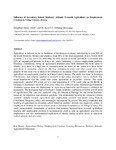| dc.description.abstract | Agriculture is believed to be the backbone of the Kenyan economy contributing to over 30% of the Gross Domestic Product and employs about 80% of the rural population. Kenya Vision 2030 positions it as a key driver for delivering the 10% annual economic growth. It is estimated that 64% of unemployed persons in Kenya are youth, indicating a serious employment problem. Emuhaya Constituency being an agricultural potential area, little attention has been taken to identify why there is a high rate of unemployment yet some of the youth who have learnt agriculture in secondary school are idle thus indulging in crime and other social vices. The purpose of this study was to analyze the influence of secondary school students’ attitude towards agriculture on employment creation in Vihiga County, Kenya. The study was done in Emuhaya Constituency and adopted qualitative research design using descriptive survey method. The target population was the youth who learnt agriculture in secondary schools. The study purposively sampled 150 youth out of a total population of 2,736 youth who sat for KCSE in Emuhaya Constituency between 2010-2012. Data was collected using structured questionnaire. Academic experts from the Department of Agricultural Education and Extension validated the instrument. The instrument had a Cronbach’s Alpha reliability coefficient of 0.814, at 0.05 level of significance. The data was analyzed using the Statistical Package for the Social Sciences, based on the objectives and research questions. The relationship between the secondary school students’ attitude towards agriculture and employment creation was tested using Pearson Correlation. Frequency tables and percentages summarized the results. The study established that teaching of agriculture in secondary school based on students’ attitude was negatively related to employment creation for out of school youth in Emuhaya Constituency of Vihiga County. The study recommended formulation of policies that promote harmonization between agriculture teaching and employment creation, it recommended youth to take up agricultural activities for employment and also recommended replication of similar studies in other levels of education such as primary and university. | en_US |

